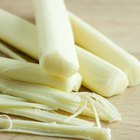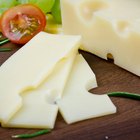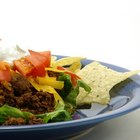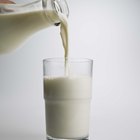
HandmadePictures/iStock/Getty Images
Swiss cheese is a white cheese that is most easily recognized by its characteristic holes, or "eyes." It has a mild flavor and is often used in sandwiches, on cheese platters and in sauces.
Nutrition Information
According to the USDA National Nutrient Database, there are 28 calories in a one-ounce slice of Swiss cheese. One slice of Swiss cheese also contains one gram of fat, 10mg of cholesterol, 73mg of sodium, one gram of carbohydrate and eight grams of protein.
Recommendations
Swiss cheese is a member of the Milk, Yogurt and Cheese group. According to the USDA, adult men and women need three cups or servings of dairy daily. One serving of natural Swiss cheese is the equivalent of one and-a-half ounces.
Health Benefits
According to the National Dairy Council, Swiss cheese and other dairy products are essential to a balanced diet and a healthy lifestyle and can reduce the risk of some chronic diseases. Dairy products contain contain important nutrients like vitamin D, calcium, potassium and protein, which help build and maintain bone mass and density and help maintain healthy blood pressure.
Related Articles

Calories in One Slice Provolone Cheese

How Many Calories Are in One Cheese ...

Nutritional Facts of Mint Chocolate ...

How to Make Fresh Strawberry Frosting ...

How to Freeze Tzatziki

Swiss Cheese Nutrition

How to Make a White Decorator Icing

How to Access a Securepak Phone Number

How Long Does Banana Bread Stay Fresh?

What Can I Use in Place of Sour Cream?

How Many Calories are in Half-Cup of ...

How to Boil Conch in the Shell

Can Age Spots Be Reversed?

How Many Calories Does a Small Banana ...

How to Freeze Empanadas

How to Dissolve Non-Instant Milk Powder

Calories in Pimento Cheese

Calories In Maltesers

How to Make Sweet Brown Rice

Can White Gravy Be Made With Almond ...
References
Writer Bio
Alexis Jenkins writes to motivate others in areas of health including nutrition, fitness training and improving lifestyle choices. She graduated with a Bachelor of Science in health science from Brigham Young University-Idaho.
Photo Credits
HandmadePictures/iStock/Getty Images